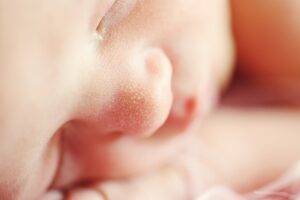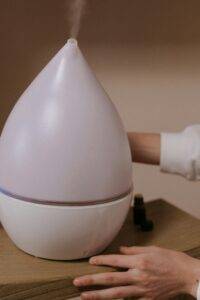Newborns are precious, delicate, and highly dependent on their parents for everything—including breathing comfortably. It’s common for new parents to feel a wave of concern when their newborn baby is congested. A congested baby can have trouble feeding, sleeping, and even breathing properly, leading to stress for parents.
While newborn congestion is usually harmless and temporary, knowing how to help your little one breathe better can make a huge difference in their comfort and your peace of mind. This guide will break down effective tips to alleviate worries when your newborn baby is congested, ensuring they can breathe more easily and comfortably.
What Is Newborn Congestion?
Congestion in newborns occurs when there’s a buildup of mucus in the nasal passages. Since newborns have such tiny nasal passages, even a small amount of mucus causes significant discomfort. While some congestion is normal, especially within the first few weeks of life, it may lead to other issues, such as difficulty feeding or sleeping.
Babies under six months old primarily breathe through their noses, so a stuffy nose is problematic. The condition may be due to environmental factors such as dust, pet dander, or dry air. Sometimes, it’s because your baby’s body is adjusting to life outside the womb and learning to clear its airways by itself.
In other cases, your newborn baby is congested could be a result of a mild infection, such as a cold. Whatever the cause, congestion can be managed at home with the right care. Let’s look at the best ways to help your newborn feel better.
Types of Newborn Congestion
- Nasal Congestion: There’s an excess mucus buildup in the nasal passages. This is most common and makes it difficult for your baby to breathe through their nose.
- Chest Congestion: This is when mucus builds up in the lungs or chest area, causing a rattling sound when your baby breathes or coughs. This needs medical attention if it persists or causes breathing difficulties.
Common Causes Why Newborn Baby is Congested
Understanding why your newborn baby is congested helps you address it more effectively. Common causes include:
- Dry air: A common occurrence during winter.
- Allergens: Includes dust, pollen, pet dander, and other environmental factors.
- Viruses: Colds and other mild infections can trigger as your baby’s immune system learns to fight off germs.
- Newborn anatomy: Babies are born with small nasal passages, making them more prone to congestion even without illness.
Let’s explore ways to effectively alleviate your newborn’s nasal congestion.
Newborn Baby is Congested: Effective Tips
1. Use a Nasal Aspirator or Bulb Syringe for Relief
This is one of the quickest and most effective methods to alleviate discomfort when your newborn baby is congested. A nasal aspirator or a bulb syringe are tools designed to gently suction mucus from your baby’s nose, helping them breathe more easily. Use this method twice or thrice a day, especially before feedings or naps when congestion tends to be most troublesome.
How to Use a Bulb Syringe:
- Prepare the syringe: Squeeze the bulb to expel any air while not in use. While squeezing the bulb again, position the tip gently at the entrance of your baby’s nostril. Make sure not to insert it too far.
- Suction the mucus: Release the bulb slowly, allowing it to gently pull mucus from your baby’s nose. When fully released, remove the bulb from your baby’s nostrils. Squeeze the mucus out onto a tissue. Repeat this process with the other nostril if necessary.
- Clean the syringe: After each use, thoroughly clean the bulb syringe with warm, soapy water to avoid the growth of bacteria or mold.
Nasal aspirators are also used similarly but offer a more controlled suction. Some parents prefer electric nasal aspirators, which offer gentle suction with less manual effort. These devices effectively clear the nasal passages but should be used sparingly to avoid irritating your baby’s delicate nasal tissues. These devices are included in your list of essentials when your newborn baby is congested.
2. Keep Your Newborn Hydrated for Thinner Mucus
Proper hydration can effectively manage when your newborn baby is congested. When your baby is well-hydrated, their mucus stays thinner, making it easier for them to breathe and naturally clearing their nasal passages.
Why Hydration Matters
Ensure your baby is fed frequently to maintain the moisture balance in their body and keep their mucus from becoming too thick or sticky. If your baby is congested and having trouble feeding, use a nasal aspirator or saline drops (will be discussed in the succeeding step) to clear their nose before offering a feeding.
For newborns under six months, the best source of hydration is breast milk or infant formula. For older babies (closer to six months or older), include small amounts of water in their diet. However, consult your pediatrician before offering water to very young infants, as they get all the hydration they need from milk. Hydration maintains the body’s natural defenses and promotes quicker recovery from congestion-related discomfort.
For a related topic on newborn feeding, this article is worth reading: Exploring Newborn Feeding for Proper Nourishment: Schedules and Tips for New Parents
3. Use a Cool Mist Humidifier to Add Moisture to the Air
If indoor air is too dry, especially during winter, it can dry out your baby’s nasal passages, worsening their congestion. A cool mist humidifier is an excellent way. Here’s how:
Benefits of a Cool Mist Humidifier
- Thins mucus: Added moisture in the air helps prevent mucus from drying out and sticking in your baby’s nasal passages. This thins and loosens mucus, making it easier for your baby, thus reducing congestion.
- Prevents irritation: Adding humidity to the air soothes your baby’s nose, reducing irritation and allowing them to breathe more easily.
Tips for Using a Humidifier
- Place the humidifier in the room where your baby sleeps, close enough, like near the crib, but out of direct reach for safety.
- Distilled water is used to prevent mineral buildup.
- Clean the humidifier regularly to avoid mold or bacteria growth, which could worsen respiratory issues. Follow the manufacturer’s manual for cleaning.
If you don’t have a humidifier, an alternative is to create a steam environment by running a hot shower in the bathroom and sitting with your baby in the room. The steam provides immediate but temporary relief by loosening the mucus in the nasal passages. However, this method should be done with caution. Ensure the room doesn’t get too hot. And of course, never leave your baby unattended.
If you’re interested in learning more about the use of a cool mist humidifier, this article is for you: 4 Major Risks of Using a Cool Mist Humidifier for a Newborn
4. Saline Drops or Spray: A Safe and Effective Solution
Saline drops or saline spray are great remedies. Saline, or saltwater solution, loosens thick mucus, making it easier for your baby to breathe. Saline drops are safe to use multiple times a day and are helpful before your baby’s feeding or sleep. Since saline is non-medicated, it can be used frequently without the risk of overuse or side effects.
How to Use Saline Drops
- Lay your baby on their back with their head slightly tilted back.
- Apply 1-2 drops of saline solution in each nostril.
- Allow a few seconds for the saline to break down the mucus.
- Use a bulb syringe or nasal aspirator to remove the loosened mucus if necessary.
Choosing the Right Saline Solution
When selecting saline drops, ensure these are formulated for infants. Adult nasal sprays may contain additives or preservatives that are too harsh for your baby’s delicate nose. If you’re unsure which product to use, ask your pediatrician for recommendations.
5. Elevate Your Baby’s Head During Sleep to Help with Drainage
When a baby lies flat, mucus pools in their nasal passages, making breathing more difficult. Elevate your baby’s head slightly while they sleep to induce the mucus to drain, reducing congestion. This small adjustment relieves congestion, and improves your baby’s sleep quality, without putting your baby at risk of suffocation or other hazards.
How to Safely Elevate the Head of the Crib:
- Place a rolled-up towel or blanket underneath the mattress at the head of the crib. This creates a slight incline without placing anything directly in the crib with your baby, reducing the risk of Sudden Infant Death Syndrome (SIDS).
- Never put pillows or loose bedding directly under your baby’s head, as these items pose a suffocation risk.
6. Maintain a Clean, Allergen-Free Environment
The environment in which your baby sleeps and plays impacts their congestion. Dust, pet dander, pollen, and other allergens irritate your baby’s respiratory system, making congestion worse. Keep your home free of irritants and triggers—creating a clean and allergen-free space, promoting overall respiratory health for your baby.
Steps to Reduce Allergens
- Regularly clean the nursery: Vacuum carpets, dust surfaces, and wash bedding often to reduce dust buildup.
- Avoid smoking: Ensure your baby isn’t exposed to secondhand smoke, which is a major irritant to their airways. Secondhand smoke can irritate your baby’s respiratory system and worsen congestion. Never smoke around your baby, and avoid taking your baby to places where they might be exposed to smoke.
- Limit pet access: If you have pets, keep them out of your baby’s sleeping area to prevent the spread of pet dander.
- Reduce fragrances: Strong perfumes, air fresheners, household cleaners, and scented laundry detergents with strong fumes can aggravate your baby’s congestion. Opt for fragrance-free or hypoallergenic products to create a more comfortable environment for your baby.
7. Know When to Contact Your Pediatrician
While most cases of newborn congestion can be managed at home, there are times when you should seek medical advice. Know the warning signs that indicate a more serious condition. Your pediatrician offers guidance on whether additional treatments are needed or if there’s an underlying condition causing the congestion.
Signs You Should Contact a Doctor:
- Trouble breathing: If your baby seems to be struggling or gasping for air, wheezing, or working hard to breathe or breathing rapidly.
- Refusing to feed: Babies need to eat regularly. If their congestion is preventing them from feeding adequately and not getting enough nutrition.
- Fever: A fever in babies under three months old can be an infection. If your baby’s temperature is over 100.4°F, call your pediatrician.
- Persistent cough: While a little coughing is normal, a persistent cough combined with congestion could be a sign of RSV (Respiratory Syncytial Virus) or another respiratory infection.
- Lethargy or Dehydration: Symptoms of dehydration such as fewer wet diapers or dry lips, or if your baby is unusually tired as congestion makes it harder for your baby to feed properly. This could signal a more serious underlying issue aside from dehydration.
If you ever doubt your baby’s condition, don’t hesitate to call your pediatrician. It’s always better to err on the side of caution for your baby’s health.
Manage Your Newborn Baby Congestion
Newborn congestion is a common issue that most babies experience at some point. It can be a source of stress for parents and babies, but the good news is that most cases can be managed with simple, at-home treatments. With the right approach, you can help your baby breathe easier and sleep better, making you and your baby feel more at ease.
With the tips outlined in this post, such as nasal aspirators, humidifiers, saline drops, and environmental adjustments, you’ll have a toolbox of methods to relieve your baby. Every baby is different, and what works for one might not work as well for another. While the tips are effective, trust your instincts. Don’t hesitate to contact your pediatrician. Early intervention prevents minor issues from becoming more serious.
For more helpful tips on newborn care, check out Omega Pediatrics. where you’ll find a wealth of resources on common infant concerns and practical tips for new parents. Whether it’s managing congestion or other newborn concerns, stay informed, stay prepared, and give your baby the best care possible during those early weeks and months of life. Nurture precious moments with your baby!








